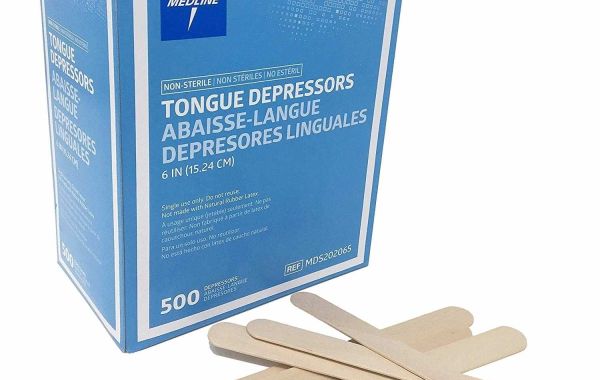In the ever-evolving landscape of medical instruments, the design and materials used in tools like tongue depressors have seen significant advancements. Among the diverse options available, silicone tongue depressors and stainless steel tongue depressors stand out for their important characteristics and applications. This article delves into the features, benefits, and applications of these two types of tongue depressors, shedding light on how they have revolutionized clinical examinations.
Silicone Tongue Depressors: A Gentle Approach to Patient Care
Silicone tongue depressors represent a modern and gentle alternative to traditional wooden or plastic counterparts. Crafted from medical-grade silicone, these depressors offer a host of benefits for both healthcare professionals and patients during oral examinations.
Key Features of Silicone Tongue Depressors:
1. Flexibility and Comfort:
- Silicone tongue depressors provide a degree of flexibility, allowing for more comfortable positioning in the patient's mouth during examinations.
2. Non-reactive Material:
- Being non-reactive, silicone does not absorb or retain odors or tastes, ensuring a clean and hygienic experience for both the patient and the healthcare professional.
3. Easy to Clean:
- The smooth surface of silicone allows for easy cleaning and sterilization, contributing to infection control protocols in medical settings.
4. Reusable and Durable:
- Silicone tongue depressors are durable and can be reused after proper sterilization, offering a cost-effective solution for medical practitioners.
5. Reduced Risk of Splinters:
- Unlike wooden tongue depressors, silicone variants eliminate the risk of splinters, providing a safer option for both patients and medical professionals.
Applications of Silicone Tongue Depressors:
1. Pediatric Examinations:
- The flexibility and gentle nature of silicone tongue depressors make them ideal for pediatric examinations, ensuring a more comfortable experience for young patients.
2. Dental and Oral Examinations:
- Silicone tongue depressors are widely used in dental and oral examinations, where their non-reactive properties and ease of sterilization are important.
3. Sensitive Patients:
- Patients with sensitivities or allergies to certain materials may find silicone tongue depressors to be a more suitable and hypoallergenic option.
4. Specialized Medical Procedures:
- In certain specialized medical procedures, such as throat examinations or surgeries, silicone tongue depressors provide a flexible and non-abrasive tool.
Consumer Appeal: Embracing Modern Materials for Patient Comfort
Silicone tongue depressors have gained popularity among healthcare professionals for their modern approach to patient care. The flexibility, ease of cleaning, and reduced risk of splinters make them a preferred choice, particularly in settings where patient comfort and safety are important.
Stainless Steel Tongue Depressors: The Durable and Hygienic Standard
Stainless steel tongue depressors represent a sturdy and enduring option in the realm of medical tools. Renowned for their durability and hygienic properties, stainless steel depressors have become a staple in various medical settings, providing reliable performance during examinations.
Key Features of Stainless Steel Tongue Depressors:
1. Durability:
- Stainless steel tongue depressors are exceptionally durable, withstanding repeated use and sterilization without compromising their structural integrity.
2. Hygienic Properties:
- The non-porous nature of stainless steel makes it resistant to bacteria and other pathogens, contributing to a hygienic environment in medical facilities.
3. Rust-Resistant:
- Stainless steel is inherently rust-resistant, ensuring that the tongue depressors maintain their quality even after exposure to various sterilization methods.
4. Weight and Balance:
- The weight and balance of stainless steel tongue depressors provide healthcare professionals with a precise and controlled tool for oral examinations.
5. Heat Conductivity:
- Stainless steel's ability to conduct heat makes it suitable for temperature-sensitive procedures where a warm tongue depressor may be required.
Applications of Stainless Steel Tongue Depressors:
1. General Medical Examinations:
- Stainless steel tongue depressors are widely used in general medical examinations, offering a durable and reliable tool for healthcare professionals.
2. Surgical Procedures:
- In surgical settings, where precision and durability are important, stainless steel tongue depressors find applications in various procedures.
3. Long-Term Use:
- Healthcare facilities that prioritize long-term usability often opt for stainless steel tongue depressors due to their robust construction.
4. Emergency Settings:
- Stainless steel tongue depressors are well-suited for emergency medical situations where a reliable and durable tool is important.
5. Routine Oral Examinations:
- Routine oral examinations benefit from the stability and non-reactive properties of stainless steel tongue depressors.
Consumer Appeal: Trusted Reliability for Medical Professionals
Stainless steel tongue depressors have earned the trust of medical professionals for their durability, hygienic properties, and reliability in various medical settings. The ability to withstand repeated sterilization and maintain structural integrity positions them as a standard tool in the medical toolkit, particularly in situations where precision and longevity are important.
Comparative Analysis: Silicone vs. Stainless Steel Tongue Depressors
To better understand the strengths and characteristics of Silicone Tongue Depressors and Stainless Steel Tongue Depressors, let's delve into a comparative analysis based on key criteria:
1. Material Properties:
- Silicone Tongue Depressors offer flexibility, comfort, and easy sterilization, making them ideal for pediatric and oral examinations.
- Stainless Steel Tongue Depressors provide durability, rust resistance, and heat conductivity, making them suitable for general medical examinations, surgical procedures, and emergency settings.
2. Hygiene and Sterilization:
- Silicone Tongue Depressors are easy to clean and sterilize, providing a hygienic option for routine examinations.
- Stainless Steel Tongue Depressors are non-porous, rust-resistant, and withstand repeated sterilization, offering a reliable and hygienic tool for various medical applications.
3. Specialized Applications:
- Silicone Tongue Depressors are well-suited for pediatric examinations, dental and oral procedures, and situations where patient comfort is a priority.
- Stainless Steel Tongue Depressors excel in general medical examinations, surgical procedures, and emergency settings where durability and precision are important.
4. Consumer Preference:
- Silicone Tongue Depressors appeal to healthcare professionals seeking a gentle and modern approach to patient care, especially in settings that prioritize patient comfort.
- Stainless Steel Tongue Depressors are trusted by medical professionals for their reliability, durability, and versatility in a wide range of medical applications.
Conclusion
In the ever-advancing field of medical instruments, the choice between Silicone Tongue Depressors and Stainless Steel Tongue Depressors hinges on the specific needs and preferences of healthcare professionals. Silicone Tongue Depressors provide a gentle and modern approach to patient care, ideal for pediatric and oral examinations. On the other hand, Stainless Steel Tongue Depressors are the stalwart choice for general medical examinations, surgical procedures, and emergency settings, offering trusted reliability and durability.
As medical technology continues to evolve, the versatility and important properties of Silicone and Stainless Steel Tongue Depressors exemplify the commitment to improving patient care and ensuring the efficiency of medical examinations across various healthcare settings.








